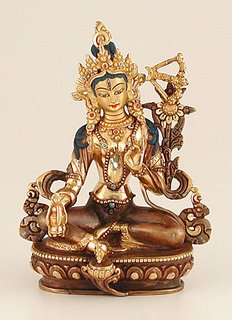In the last post someone asked about killing animals, such as the deer tick, and what types of life are considered sacred to Buddhists. This is a deep and rich topic.
Plant life is not considered bad to kill because it is not sentient. Anything with volition is sacred. This includes deer ticks, ants, mosquitos, and the like. It is impossible for us not to kill, just by our very existence. But that doesn't mean we can't try to do as little as possible. His Holiness the Dalai Lama is not a vegetarian because he gets jaundice unless he eats meat. His take is that, even if you cannot be a vegetarian, you can at least be joyful that there are those of us who can. I felt remorse at taking the lives of the deer ticks. The truth is that I didn't know what else to do, and I was so overcome with the desire to get rid of them, that the idea of somehow letting them live never took hold. This is a signal to me that I am not as advanced as I'd like to be. I did not maintain my detachment. Here's another example. A couple of weeks ago I went for a hike up in the mountains. (This is when I saw the rat snake.) I meditated in a little side valley off of the main trail. Right in the middle of my meditation, a mosquito landed on my hand. I watched as it inserted its needle-nose into my skin. I let it, figuring it was best not to kill. Unfortunately, the longer is stayed, sucking my blood, the more agitated I got. I finally brought it up to my face to look closely, and its abdomen had turned ruby red. I experienced an extreme revulsion, but I had the compassion to blow on it to signal it to fly away. So it did, but it continued to buzz around, and finally it landed on my shirt. Having lost all patience, I killed it. I really regret it now. Perhaps I can do better in the future.
We humans are lucky because we have the choice not to kill. Many animals, especially predators, are not so lucky. It is their nature to kill, and in so doing, they create negative karma, just like the negative karma created by my vengeful mosquito murder. In Buddhist mythology, there are 6 realms of samsara: the realm of humans, the realm of animals, the realm of hungry ghosts, the hell realms, the realm of jealous Gods (demigods), and the realm of Gods. Buddhas have completely transcended all of these realms. Depending on the karma you create in this and past lives, you are reborn in a different realm. The human realm is an auspicious realm because we have the capability of transforming negative karma through our spiritual practice. In other words, we can turn suffering into progress. We can use obstacles as teachers. If your karma is too negative, you are reborn as an animal, and it can take you eons to escape, because you keep creating more negative karma. Hungry ghosts and the hell realms are even more negative. The jealous Gods and Gods are more positive, but their egos get bloated, and they can't see beyond their ignorance. It is said that a God lives in extreme luxury. All his or her wants are fulfilled, and they live in extreme happiness and contentment. This is because of great virtue in previous lives. Unfortunately, they are wasting this positive karma, completely burning it off for self-centered debauchery, if you will. I think that 7 days before a God dies, they realize they are going to die, and they experience intense suffering in those last days. Having burned off their positive karma, they are reborn in a lower realm. Humans have the power to transcend the cycle of samsaric suffering by following the bodhisattva path, which means: 1)Having genuine compassion for all sentient beings, like people, including those we usually ignore or dislike, like mosquitoes, like deer ticks. 2)Having true perception of the nature of reality, that nothing exists independently from other things and from our conceptualization.
I would like to mention something Alexander Berzin, H.H. the Dalai Lama's translator has pointed out. Namely, in being kind to insects, we shouldn't neglect other human beings. It would be outrageous indeed to go to elaborate lengths to rescue an ant from drowning, but then to turn away someone at your door asking for help.



